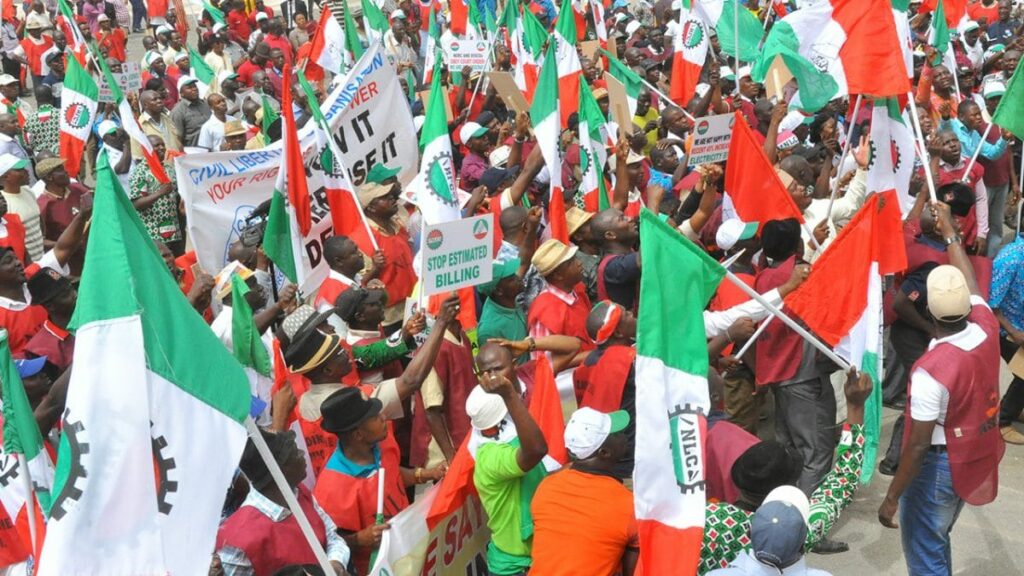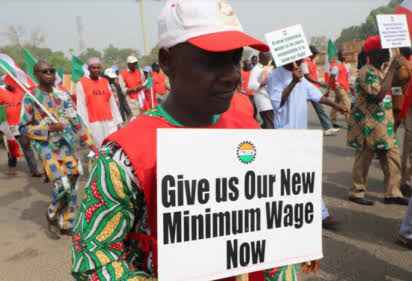THE LESSONS OF THE 1945 GENERAL STRIKE

By Davy Fidel
Today’s labour movement will not be documenting itself without drawing significant lessons from the 1945 general strike. This is one of the strikes that saw workers from both the public and private sectors, united in solidarity to demand improved living conditions and better wages.
It was a strike that lasted for 45 days and it led to a total shutdown of the economy. This was at the period when World War II just ended and there was an increase in the cost of living. Workers are meant to bear the cause of the loss of the war. There was completely stagnant and the British imperialist and colonialist governments refused to do anything about it.
Rather, they want workers to bear the loss of the war and continue to live with the harsh economic realities confronting them. It is like what we have today. The Buhari government under the APC, through its neo-liberal policies, want workers to keep bearing the social realities they are facing. Inflation, low wage, unemployment etc. are what millions of working-class families are passing through in this system of capitalism. Whether people like it or not, the Buhari regime has failed in its policies and program to improve the living condition of people.
It has failed because the regime is tied to the policies of the IMF and World Bank which dictate to the government when to remove subsidies by hiking the cost of electricity and petroleum. It is also tied to defending the agenda of private capital despite the propaganda of fighting corruption. The recent 4 trillion oil subsidy fund is another case we cannot take away, our eyes off.

The regime has not served any better since it came to power in 2015. Beginning from the recession that hits the country, the government have wanted workers and the oppressed to bear the heaviest part of the economy. This is in terms of increase in electricity tariff, high cost of living, inflation and other harsh economic realities. The minimum wage is something that is not on the agenda of the government.
The 1945 general strike demonstrated the might of workers to win. More than “200,000” workers and “17 labour unions” were involved in the strike. It was the first general strike in the history of Nigeria that shocked the colonial ground. It wasn’t unexpected, however, it was significant.
It all started on March 22, 1945, when the Joint Executive of Government Technical Workers were aggrieved over the high cost of living, especially the low wage they received. The workers lhad sent a letter to the colonial government demanding a 50% increase in the cost of living allowance (COLA) as it was referred to when the strike started. But the government ignored it through their reply on May 2 1945.
They argued that unless the public is willing to reduce the “consumption of commodities” the essence of increasing the wage of workers – the cost of living allowance won’t be possible. This is a background of what also added to the 1945 general strike. The living condition of workers was terrible.
It is a confirmation of what capitalism represent – a system that is not willing to lose and cut from its profit to improve the living condition of people. Covid-19 was a case in reference. The similarity is what we have today. Since the Buhari regime is in power, the economy hasn’t been better. Poverty has increased geometrically and people are finding it hard to bear the cost of living.
IMOUDU’S ROLE AND THE LABOUR LEADERSHIP
Of course, the significance of the 1945 general strike is not what history will bluff off or goof at, especially the leadership of the labour movement. We can’t be narrating the 45 days of the general strike, which started June 22 1945 without also referring to the leadership of the Civil Service Union, Railwaymen, and the lives of Osmond Odugbesan, A. Oshosanwo, A.J. Marinho; and importantly, Michael A. O Imoudu.
They stood their ground but with the pressure from below i.e. from workers who are most affected in the economy. Despite the bureaucracy in the trade unions as we have it today might not be much different.
However, the workers were agitated. They were resilient and incontrovertible. The agitation of the aggrieved workers forced the leadership of T. A Bankole, the president of the All Nigeria Trade Union Congress, to be replaced with Michael Imoudu.

This is not for any other reason but the leadership of Bankole was felt to have compromised. That its leadership had started “listening” to the government to “call off the strike” was a blow to the workers. . For a lot of workers, it is either winning or never fighting again. The workers were conscious to bite the system to feat their demand and they did.
Imoudu’s role in the general strike after his release from detention cannot be scratched off the lip of the labour movement. His selfless leadership in the trade union and impact on the strike was a striking example for the movement generally.
Imoudu became the president of the Railway Workers Union (TWU) in 1939 same year the union was registered under the trade union Ordinance. This allows the union to seek collective bargaining with the employers. Also Imoudu played. The union under Imoudu’s leadership demanded improved working conditions, higher wages and an end to casualization. Imoudu’s in 1943 was arrested and detained.
Importantly, for the working masses, politics must be steam they must need to contend power with the ruling elites. Pa Imoudu in his decisive approach to the trade union struggle recognized it. He joined the National Council of Nigeria and the Cameroons (NCNC) and in the second republic joind the Peoples Redemption Party, PRP, founded by another former labour leader, Mallam Aminu Kano as a political party to continue the defends of workers’ rights
THE LESSONS
The lessons of the 1945 general strike cannot be quantified or immeasurable. It is a struggle that workers today in the labour movement and the trade unions must begin to draw inspiration from. Of course, things have changed. However, the system of capitalism remains the same. The living condition of workers hasn’t changed that much.

The minimum wage of N30,000, which many state governments have refused to pay, is what workers are receiving. The new minimum wage is needed to catch up with the cost of living and inflation. An example is to start with a figure above the N52, 200 minimum wage demanded in 2018 by the labour union, which the 1945 general strike demonstrated.
Workers in the trade unions must recognize the importance of this significant part of their lives. They must begin to challenge their leadership in the NLC and TUC to initiate the process of demanding a new minimum wage. This is long overdue since the last minimum wage agreement was signed into law in 2019 under this regime. Since then, the N30,000 minimum wage has been crushed to pieces with the cost of living, inflation, devaluation of the currency, and the unproductive economy of Nigeria rooted in capitalism.
Workers must put pressure on the leadership of the NLC and TUC to commence action on it. Although the last of a few protests had reported the slogan of N100,000 minimum wage to be implemented. This is not out of sight. Rather, workers deserved good living conditions.
The ruling elites, defending the system of capitalism, are not ready and willing to increase workers’ wages. They are comfortable with the paltry wage workers are receiving. That is why this part of history is significant to the lessons of the labour movement. The leadership role played by Michael Imoudu to organise workers in the trade union and also Railway is not an oversight.
They are important parts of the history of the trade union movement in Nigeria. The task of building a political alternative is calling on the labour movement to draw inspiration from the 1945 general strike and other workers’ movements. The political charter of demand is not enough without workers organizing with programs that will force the government to meet their demands.
Above all, a socialist planned economy is required to re-organise society under the democratic management of workers and the oppressed. But to achieve this, workers in the trade unions must begin to understand they need to commence the process of building a political alternative that will contend power with the ruling elites and the system of capitalism.
